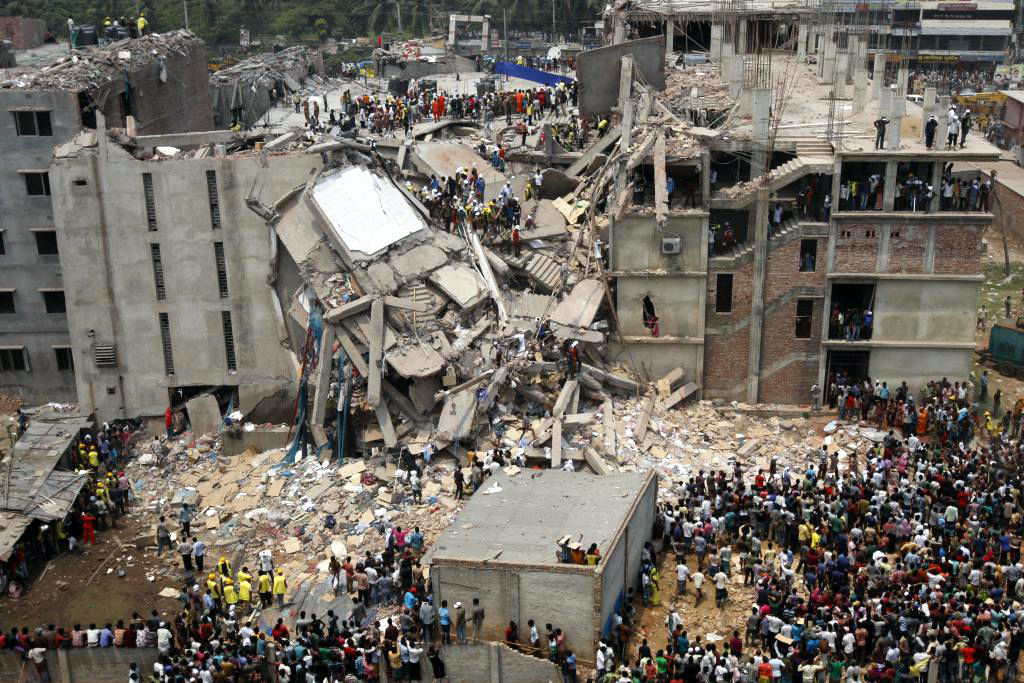Eighth anniversary of the Rana Plaza accident Development Minister Müller urges that there must be “no repeat of Rana Plaza”
“Anyone who buys a T-shirt labelled ‘Made in Germany’ must be certain that no workers have been exploited in its manufacture and especially that it has not been made using child labour. Around the world, there are more than 70 million children toiling away in factories, quarries and coffee plantations – also working to produce the goods that we buy. That is modern slavery. That is why I am campaigning for the supply chain law. It is a law which can change this situation and that is what we want to do. Whether we can manage to move away from free trade to fair trade is the social issue in the 21st century.”
Müller went on to say that this law will mean that ‘Made in Germany’ is “not only a sign of the highest quality, but also stands for human rights and fair production. Many companies, such as Daimler or Tchibo, see this the same way and many of them – including many small and medium-sized companies and textiles manufacturers – are calling for a law to be passed. The idea is to have a law which will ensure that fundamental human rights standards – like a ban on child labour and forced labour – are respected at the start of our supply chains.
The companies participating in the Green Button are showing us that this is possible. There are now 63 of them – ranging from major retailers like Lidl or Aldi, via sports labels like Jack Wolfskin, all the way to start-ups. It is also a signal for the rest of the corporate world: sustainability is a competitive advantage. Because, more and more customers now want to be sure that fundamental minimum standards are being met during the production of the goods they buy.”
The contribution of development policy in the textiles sector
The Federal Cabinet adopted the draft legislation for corporate due diligence obligations in supply chains on 3 March. On Thursday, 22 April, in the first reading of the bill introduced for this purpose, the Bundestag deliberated the proposed law.
In September 2019, the government-run textiles label Green Button was introduced. The Green Button is built on a total of 46 stringent social and environmental criteria. In addition to the scrutiny applied to the individual product, an audit is also made of the entire company. A few products ‘for show’ is not enough. This means that consumers can be sure that textiles which carry the Green Button label have been manufactured in accordance with high sustainability standards. A year after its launch, the Green Button had established itself in the market place. Meanwhile, 63 companies have been successfully audited and more than 100 other companies have applied to take part. In 2020, more than 90 million certified textiles were sold. The label can now boast its first company that is not based in Germany and more companies based in other countries in Europe are currently being audited. The Green Button is becoming increasingly important in the context of both public and private procurement. Hotels, hospitals and public institutions at the federal, state and municipal levels are making greater use of the label as a point of reference for the procurement of textiles made using sustainable production methods.
Over the next few months the Green Button will be developed further: the Green Button 2.0 will take the level of the standards to be met by companies and products up a further notch, thus offering even more protection for the people and the environment at production sites. Companies, civil society and academia are closely involved in this process of further development. During the public consultation for the first draft of the 2.0 company requirements, more than 2,000 suggestions were received and they have been fed into the revision process. After a second phase of consultation for the company and product requirements, the Green Button 2.0 standard is due to be adopted in September 2021. The first company audits on the basis of this new standard are scheduled for 2022.
In 2014, as a direct response to the Rana Plaza accident, the Development Ministry furthermore founded the Partnership for Sustainable Textiles. The Textiles Partnership currently unites 138 members from business, civil society, trade unions and standards organisations and the German government. The key players and stakeholders are working together in this Partnership. Members have come together, for example, to campaign for a ban on toxic chemicals being used in connection with the production of textiles or to lobby for grievance committees to be set up in spinning mills in India.
Background information
This year marks the eighth anniversary of the horrific collapse of the Rana Plaza textile factory in Bangladesh. The disaster, which occurred on 24 April 2013, claimed the lives of 1,138 people and left more than 2,500 others injured. Very shortly after the accident occurred, the Federal Ministry for Economic Cooperation and Development made compliance with social and environmental standards in the global production of textiles a political priority, launching efforts to bring about fundamental change in the entire textiles industry.
With the Partnership for Sustainable Textiles, the government-run Green Button and the initiative for a law to enforce compliance with corporate due diligence obligations, German policymakers have set in motion important changes that will establish the foundations for securing more sustainability – both voluntary and mandatory – throughout global supply chains.
